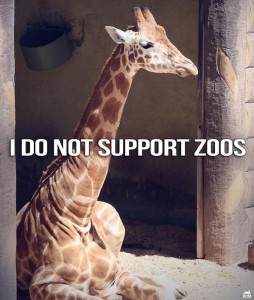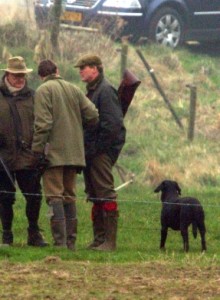Worldlog Semana 8 – 2014
Marius, la jirafa matada en un zoo en Dinamarca, está en boca de todos. Mi colega Esther Ouwehand hizo varias preguntas en La Cámara sobre la situación en zoológicos en Holanda. Opinamos que hay que abrir la discusión sobre la aceptabilidad ética de la crianza de animales en zoológicos para después sacrificar los animales jóvenes. Los zoológicos son instancias comerciales que cada año utilizan sus animales jóvenes para traer público.
En Alemania e Inglaterra está prohibido sacrificar animales sanos. Lamentablemente todavía no es así en Holanda (y Dinamarca). Es una cosa que hay que cambiar pronto. En cualquier caso, nosotros somos contrarios a guardar animales salvajes en zoológicos. La exhibición de animales ya no es cosa de estos tiempos. Hoy en día existen tantas posibilidades de enseñanza ecológica. Para enseñar niños y adultos sobre la naturaleza y el reino animal es mejor salir todos al campo para descubrir. Porque de esta manera, el mensaje sigue siendo que es normal encerrar animales salvajes. ¡Pulsa aquí para firmar la petición para cerrar el zoológico Danés!
Esta semana pasada tuve un debate sobre la privacidad. La privacidad significa seguridad. Cada vez que renunciamos a nuestra privacidad, renunciamos a una parte de nuestra seguridad.
El gabinete prometió presentar un informe sobre la recopilación, la conservación y la venta de amplios conjuntos de data, el llamado ‘Big Data’, por parte de empresas e instituciones (de asistencia sanitaria). Los datos médicos son muy sensibles debido a su carácter privado y si la información guardada en ellos saliera a conocimiento de todos, pudiera impedir que la gente siga consultando médicos. El ministro de finanzas también prometió prestar más atención a los niños. Las aplicaciones en smartphones y tabletas los persuaden a bajar juegos interesantes, pero a cambio de datos privados. Opinamos que eso, por parte de niños, no debería ser posible.
Parecía una iniciativa tan noble y generosa, la conferencia de la semana pasada, de someter a discusión la caza de especies de animales amenazadas. Los príncipes Carlos y Guillermo del Reino Unido tomaron la iniciativa y numerosas organizaciones de protección ecológica se apuntaron. De hecho, no hay tiempo para perder porque los tigres, los elefantes, los rinocerontes y numerosos otros animales están malamente por la caza ilegal.
Pero, ¿son fidedignos los príncipes cuando se trata de sus propios hábitos de caza? El príncipe Guillermo, unos días antes de dicha conferencia, se había ido unos día a España, al coto de caza privado del Duque de Westminster para cazar ciervos y jabalíes. Se sabe que en España se admiten formas prohibidas en el resto de Europa, como la caza de lanzas desde caballos y la batida.
El príncipe Carlos hizo saber al gobierno Inglés que si se prohibiera la caza de zorros, él posiblemente dejaría el país para esquiar el resto de su vida en vez de ser rey. También nuestro propio rey Alejandro es amante ferviente de la caza, tanto en Holanda como en el extranjero.
Si los miembros de las familias reales quieren utilizar su influencia para impedir la extinción de animales, ellos mismos tendrán que hacer este gesto generoso: dejar de matar animales para la diversión, también si se trata de especies (todavía) no amenazadas.
El viernes pasado fue el día de San Valentín. Esta imagen lo ilustra:
http://newsfeed.time.com/2014/02/12/see-birds-fly-in-the-shape-of-a-heart/
Un saludo,
Marianne
Marius, the killed giraffe from the Zoo in Denmark justifiably exercises many Dutch minds. My colleague Esther Ouwehand asked Parliamentary questions about the Dutch situation. We think that there should be a discussion on the ethical acceptability of breeding animals in the Zoo and then killing the young ones. Zoos are commercial institutions that want to have young animals every year to attract more public.
In Germany and England it is forbidden to kill healthy animals. Unfortunately, that is not yet the case in the Netherlands (or Denmark). That must change soon. We are not in favour of keeping wild animals in Zoos any way. Exhibiting animals is something that belongs to the past. There are many possibilities to learn something about nature. To impart knowledge on the animal kingdom to children and adults, it would be better to bring the children into Dutch nature to discover wild animals. The message is now that it is okay to keep wild animals in captivity. Sign the petition here to close the Zoo in Denmark!
Last week, I had a debate about privacy. Privacy is safety. Every time we give up privacy, we give up part of our safety.
The government has promised to formulate a vision on the gathering, keeping and selling of big datasets, so-called ‘Big data’, by companies and (healthcare) institutions. Medical data is highly privacy sensitive and if the data becomes public it might discourage people from visiting a doctor. The Minister of Economic Affairs also promised that the government will pay extra attention to protecting children. Children are often invited to play games on smartphones and tablets, but then have to give access to privacy sensitive data. We think that exchanging privacy sensitive information for apps should not be allowed!
It seemed such a noble and generous initiative – last week a conference was held on the hunting of threatened species. Prince Charles and Prince William took the lead and many nature protection organisations joined them. Indeed, there is no time to lose because the tigers, elephants, rhinoceros and many other endangered animals are in a bad way.
But how reliable are those Princes when it comes to their own hunting hobby? A few days prior to the conference, Prince William went to Spain to hunt for deer and wild pigs at the Duke of Westminster’s hunting grounds, while it is generally known that the Spanish allow ways of hunting that are now prohibited in many European countries, such as hunting with spears from horses and drive hunting.
And Prince Charles has already let us know that if the English government should decide to ban fox hunting, he might leave the country to ski for the rest of his life instead of becoming the King. Our own King Willem Alexander is also a fervent hunter at home and abroad.
If the members of the Royal families really want to use their influence to guard animals from becoming extinct, they first have to make a generous gesture themselves: stop killing animals just for fun, also if they are not (yet) threatened.
Last Friday was Valentine’s Day. This was part of it:
http://newsfeed.time.com/2014/02/12/see-birds-fly-in-the-shape-of-a-heart/
Greetings,
Marianne


